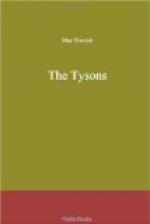Unfortunately this time Tyson was in no mood for laughter. The plebeian was uppermost in him. His wrongs rankled in him like a hereditary taint; this absurd quarrel with Stanistreet was a skirmish in the blood-feud of class against class. Tyson was morbidly sensitive on the subject of his birth, but latterly he had almost forgotten it. It had become an insignificant episode in the long roll of his epic past. Now for the first time for years it was recalled to him with a rude shock.
How real it was too! As he thought of it he was back in the stifling little shop. Faugh! How it reeked of shoddy! Back in the whitewashed chapel, hot with the fumes of gas and fervent humanity. He heard the hymn sung to a rollicking tune:—
“I am so glad that my Father in heaven
Tells of His love in the book He has given.
“I am so glad that Jesus loves me,
Jesus loves me, Jesus loves me,
I am so glad that Jesus loves me,”
etc.
The hateful measure rang in his ears, racking his nerves and brain. He could feel all the agony of his fierce revolting youth. The very torment of it had been a spur to his ambition. He swore (young Tyson was always swearing) that he would raise himself out of all that; he would distinguish himself at any cost. (As a matter of fact the cost was borne by the Baptist minister.) The world (represented then by his tutor and a few undergraduates), the world that he suspected of looking down on him, or more intolerable still, of patronizing him, should be compelled to admire him. And the world, being young and generous, did admire him without any strong compulsion. At Oxford the City tailor’s son scribbled, talked, debated furiously; the excited utterance of the man of the people, naked and unashamed, passed for the insolence of the aristocrat of letters. He crowned himself with kudos. How the beggars shouted when he got up to speak! He could hear them now. How they believed in him! Young Tyson was a splendid fellow; he could do anything he chose—knock you off a leading article or lead a forlorn hope. In time he began to be rather proud of his origin; it showed up his pluck, his grit, the stuff he was made of. He owed everything to himself.
And that last year when he let himself go altogether—there again his origin told. He had flung himself into dissipation in the spirit of dissent. His passions were the passions of Demos, violent and revolutionary. Tyson the Baptist minister had despised the world, vituperated the flesh, stamped on it and stifled it under his decent broadcloth. If it had any rights he denied them. Therefore in the person of his son they reasserted their claim; and young Tyson paid it honorably and conscientiously to the full. In a year’s time he knew enough of the world and the lust of it to satisfy the corrupt affections of generations of Baptist ministers, with the result that his university career was suddenly, mysteriously cut short. He had made too many experiments with life.




